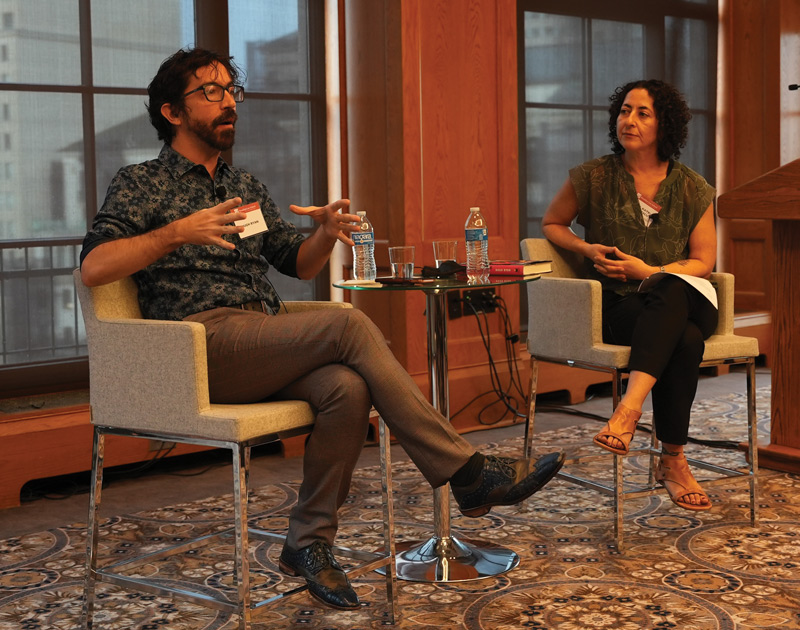DISCOVERY | INTELLECTUAL LIFE
Hugh Ryan Book Explores Intersection of NYC’s Queer and Carceral Histories

Professor Kate Mogulescu, right, interviews author Hugh Ryan about his latest book as part of our Book Talk series.

Author Hugh Ryan shared insights from his latest book, The Women’s House of Detention: A Queer History of a Forgotten Prison, which delves into LGBTQ history and the dramatic story of a now-shuttered women’s prison in New York City, as part of Brooklyn Law School’s Book Talk series.
“When I started researching queer history, the trail led me back to prisons, as places of confinement, community, and as vast unexplored archives of LGBTQ history,” said historian and curator Ryan, during a Sept. 19 book talk at the Subotnick Center. It was moderated by Professor Kate Mogulescu, with participation by Professors Alexis Hoag-Fordjour and Jocelyn Simonson, the three co-directors of the Center for Criminal Justice, which sponsored the event.
Following that trail, in the wake of his award-winning first book When Brooklyn Was Queer, led Ryan to one infamous prison in New York’s Greenwich Village. From 1929 to 1974, the so-called “House of D” was filled with stories of the thousands of incarcerated women and gender-nonconforming people subjected to neglect and brutal treatment.
In his talk, Ryan shared many of its stories, bringing to life not only how the law served to warehouse women and trans men who didn’t conform to society’s repressive norms but how the House of D played a role in the Village neighborhood that witnessed and became a rallying point for the city’s queer community. In the early days, said Ryan, women were arrested and given indeterminate sentences simply for wearing pants, for appearing “too masculine,” or for the crime of “common lewdness.” Some prisoners were made to wear the letter “D” for “degenerate” on their uniforms. They were overcrowded, subjected to invasive procedures, and received little medical care, yet these mostly impoverished inmates supported one another.
In the 1950s, political prisoners such as Ethel Rosenberg and Communist Party leader Betty Gannett served time in the House of D. And in the 1960s and early ’70s, imprisoned activists like Black Panthers Afeni Shakur and Joan Bird helped forge mutual support with the Gay Liberation Front. From cells that were near the Stonewall Inn, during the 1969 uprising, prisoners launched their own riot, setting fires and chanting “Gay rights!”
Shuttered in 1974, following investigations of cruelty, the prison has a history that’s been all but erased, yet has much relevance today. “At least one-third of incarcerated women today are queer,” Ryan said. “Yet there’s almost no conversation about this crisis of incarceration today and about this part of the queer community.”
Brooklyn Law School’s centers offer students and alumni deep dives into various legal disciplines, including health policy, entrepreneurship, international business law, criminal justice, business law, language and cognitive sciences, public service, and trade secrets. Learn more at www.brooklaw.edu/centers